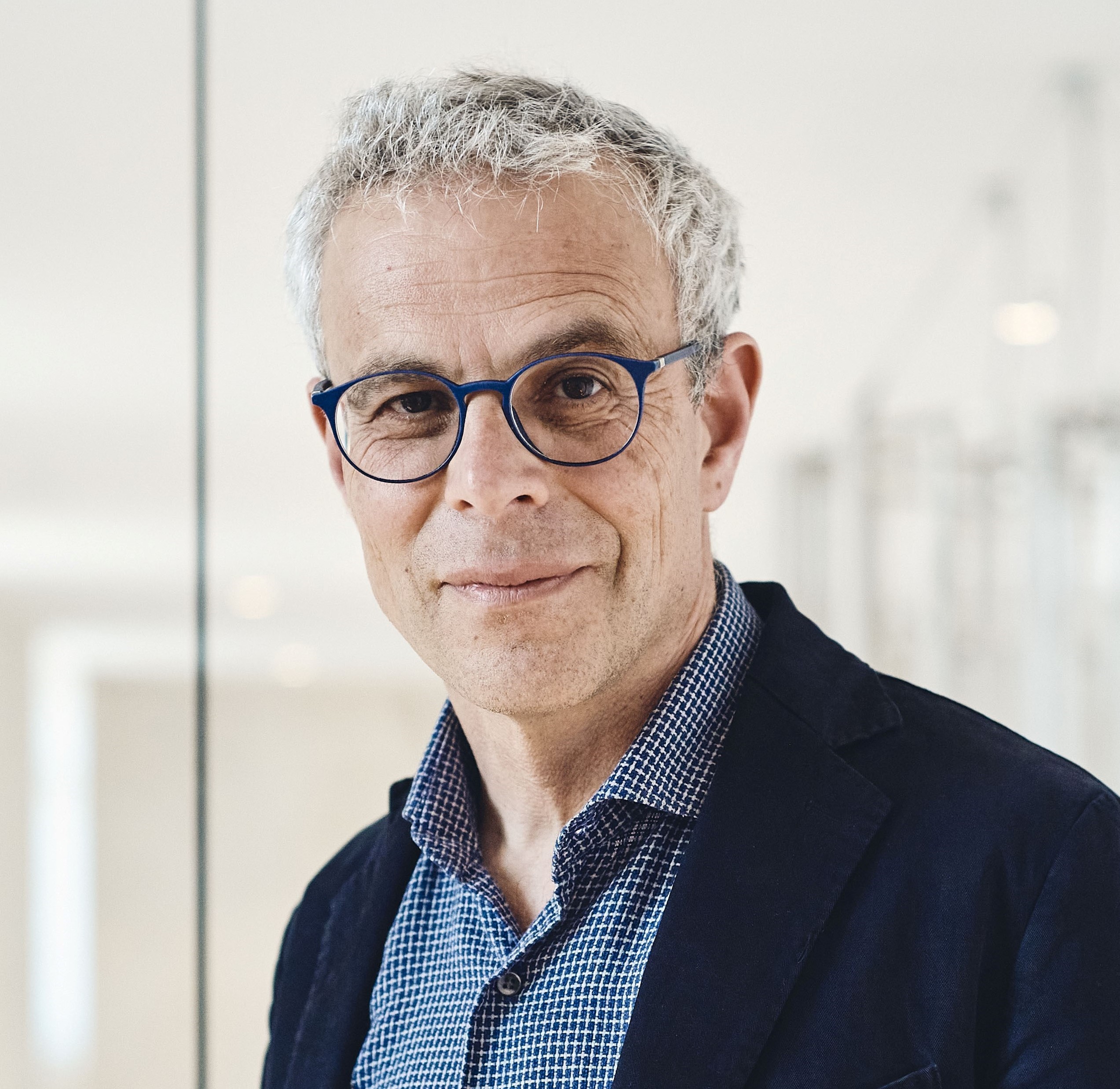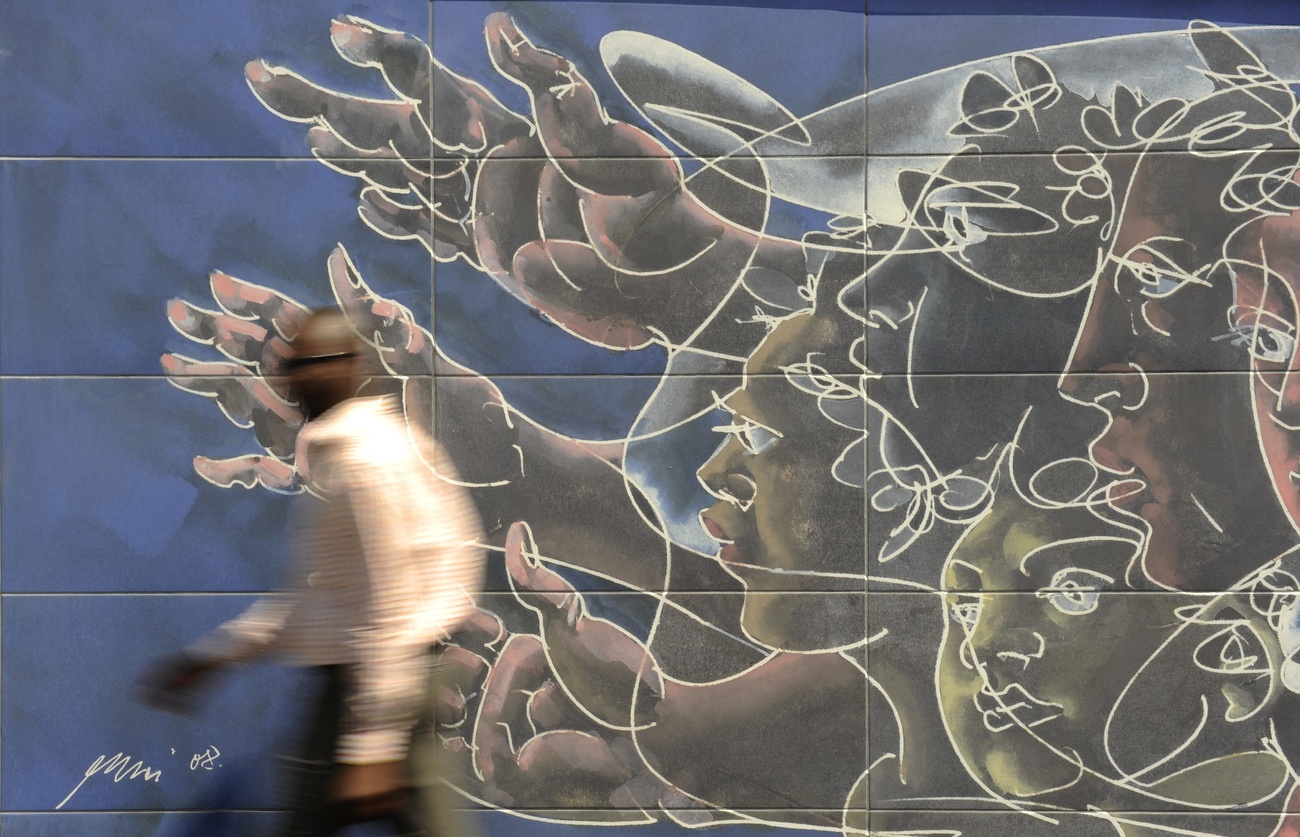
‘There is no such thing as an altruistic state’

Laurent Goetschel is arguably the most high-profile promoter of peace in Switzerland. Does peacebuilding still have a place in a world where the neutrality of some states is being called into question?
The war in Ukraine seems far away from Basel city centre on this autumn morning. Market vendors are selling sunflowers as construction workers set up rides for a popular annual fair not far from a former military barracks along the Rhine River. Soldiers used to sleep in these barracks, but now they are the headquarters of the institute swisspeace.
The organisation made its new home in this location in 2019 after the canton decided to co-finance it with a CHF400,000 ($424,000) yearly contribution. Today swisspeace is considered Switzerland’s biggest non-governmental actor in civil peacebuilding.
Laurent Goetschel (57) spent his childhood in Bern. He studied political science and international relations in Geneva. He was a visiting scholar at the Center for European Studies at Harvard University and the Center for International Conflict Resolution at Columbia University. Goetschel led a national research programme on Swiss foreign policy and was a political science lecturer at the University of Bern. In 2000, he became the director of swisspeace and a professor of political science at the University of Basel. He served as the political advisor for the then-Swiss Minister of Foreign Affairs, Micheline Calmy-Rey, from 2003 to 2004.
SWI: Mr. Goetschel, what can swisspeace do in Ukraine?
Laurent Goetschel: We’re training Ukrainians on how to document alleged war crimes so that one day this information can be used in a criminal court. The demand for this training is high.
The war in Ukraine has shown us that we must take strategic military considerations into account when we plan civil peacebuilding. Look at nuclear weapons: there is a general belief that deterrence prevents wars. But now we see that it can also enable wars. If Russia were not a nuclear threat, the war in Ukraine would be very different. We’re looking at how we can bring nuclear disarmament and peacebuilding into the same conversation.
SWI: In other words, nuclear weapons prevent big wars but fuel smaller conflicts?
L.G.: Exactly. That’s what’s happening in Ukraine right now.
SWI: If you look back at the last 30 years of your career, would you say that peace promotion has failed?
L.G.: I like to compare peace research with medicine. It is always one small step at a time. But just like some illnesses, war does not simply disappear. The success of peacebuilding shouldn’t be measured only by wars breaking out or not.
SWI: Do you apply the lessons learnt from past conflicts to new conflicts?
L.G.: Yes, we do. Transitional justice and coming to terms with the past are very important for us. It’s about assuring victims that the crimes they experienced won’t be repeated. Political decision-makers have to know that they will be held accountable sooner or later. At the same time, we want to be sure that conflict will not flare up again. Most civil wars are not being fought for the first time.
SWI: Let’s talk about the impact of peacebuilding. What’s the greatest practical success swisspeace has achieved?
L.G.: Bringing together influential people who are not directly involved is a core aspect of our work. It worked in Afghanistan even though the Taliban have now returned to power. When the Americans invaded in 2001 and it came to forming a new government, the adviser of the UN Secretary General reached out to us and said: “We have forgotten about civil society.” Within a few days, we arranged a meeting in Bonn for 80 representatives of Afghan civil society. The whole process was chaotic, but the groups that were formed during this time still exist. I think that the best and most sustainable accomplishments during the engagement in Afghanistan were achieved by civil society. There was far too much corruption in the government.
SWI: So you rely on people who sit on the lower echelons of power?
L.G.: Yes, but intellectually these are people of the highest level. We work with lawyers, teachers and village elders. During the war in Syria, we used this approach. We reserved a room at the UN building in Geneva for representatives of civil society who were not involved in the official negotiations. Unfortunately, the peace talks never happened.
SWI: Switzerland was elected for a two-year, non-permanent seat on the UN Security Council with the slogan “A Plus for Peace”. What are your expectations?
L.G.: Peacebuilding happens on the ground, not in New York. But New York is still important indirectly. The Security Council is a prestigious club where you build relationships with influential people. Switzerland will be able to influence UN peace processes with its seat on the Security Council. When you are a member, you are perceived as an important player.
SWI: It sounds as if the seat on the Security Council is mainly in Switzerland’s own interest.
L.G.: Absolutely. There is no such thing as an altruistic state. If you were to put it bluntly and say that promoting peace is about image-building for Switzerland, it would probably be true. It’s valuable for a country to have a good international standing, not only as a compensatory measure for disputes like banking secrecy. In the past, Switzerland had been perceived as selfish, disinterested, detached and profit-focused. This is not the image that Switzerland wants to have today, and peacebuilding will certainly serve its reputation.
SWI: Other countries have challenged Switzerland’s role as a mediator and host country.
L.G.: Yes, there’s a competition for “who is the best”. Promoting peace is in its own right about promoting your own relationships and Switzerland is certainly interested in polishing its self-image. Even the right-wing parties are in favour of peacebuilding. But this does not mean that they want to spend more money on it. They just think it’s a good thing.
SWI: The world is becoming more polarised. The rift between liberal democracies and the autocratic bloc has increased, technologically and militarily. Can Switzerland retain its role as a neutral mediator in this environment?
L.G.: Switzerland has to position itself substantively and politically so it can keep playing this role. This doesn’t mean that it has to pick sides in a conflict. As a mediator, Switzerland must be impartial, but not without values. Switzerland can be neutral, but at the same time clearly belong to the Western community of values.
Generally speaking, warring parties do not like neutral states. Russia complains about the sanctions, and Ukraine wants Switzerland to allow the re-export of our ammunition from Germany. But criticism is a sign that a neutral state is doing its job well. The role of peace promoter only kicks in when a conflict winds down, based on the criticism you got during the hot phase of the conflict. We’re not being pushed to the side but our foreign policy needs to have some backbone.
SWI: What do you mean by that?
L.G.: I’d like to see the Swiss government prepare a counter-proposal to the upcoming initiative of the Swiss People’s Party [launched by the anti-Europe group Pro Suisse to “preserve Switzerland’s neutrality”]. Fine-tuning the 1993 report on neutrality would do the government’s credibility and self-image a world of good. It would be important to to clarify that being neutral is not equivalent to being disinterested. We see our added value in promoting peace and doing conflict resolution, not in warfare.
SWI: But at the moment, the weapons are doing the talking. Are you advocating for peace in Ukraine at any price?
L.G.: Peace negotiations are only possible when both warring parties want them to happen. Neither [Ukrainian President Volodymyr] Zelensky nor [Russian President Vladimir] Putin can be forced to the negotiating table.
Switzerland has always called out and condemned the violation of international law. The question now is whether Switzerland sees its own added value in this conflict in delivering weapons, directly or indirectly. I think that Switzerland will achieve more in peacebuilding if it stays out of the arms business. One could argue that it is opportunistic to stay out of it and then want to mediate. But if there is no truce, then sooner or later the two parties will have to negotiate. I can well imagine that Switzerland can play a role there as it has not behaved as the others have.
Translated from German by Billi Bierling/gw. Editor: Marc Leutenegger

More
Swiss successes, risks and failures mediating peace abroad

In compliance with the JTI standards
More: SWI swissinfo.ch certified by the Journalism Trust Initiative




























You can find an overview of ongoing debates with our journalists here . Please join us!
If you want to start a conversation about a topic raised in this article or want to report factual errors, email us at english@swissinfo.ch.